 The travel industry makes up a large percentage of Google’s revenue. Based on a report published back in 2011, travel and tourism is the third highest spending industry when it comes to AdWords. I doubt this has changed a great deal since then.
The travel industry makes up a large percentage of Google’s revenue. Based on a report published back in 2011, travel and tourism is the third highest spending industry when it comes to AdWords. I doubt this has changed a great deal since then.
With many major players in the travel industry, the costs and advertising landscape is getting more and more competitive so it is vital that you manage your paid search account effectively.
In this post, I am going to share with you some tips that although suited to the travel sector, will also be relevant for other industries if adjusted slightly.
The Industry Specifics
Seasonality
One of the main factors that impacts the travel industry when it comes to advertising is seasonality. Of course, this depends on the destination but unless you are selling holidays to an all year round destination you will need to consider seasonality within your AdWords campaigns.
I would recommend having separate campaigns for each destination so you can have full control over the settings and when you want to increase/decrease spend.
Start off by getting all your data together so you can really understand when certain destinations sell most and when the sales start to dip. Are there certain days of the week that convert more for you than others? Are different times of the day better than others? You will need to have all this information to hand before starting to build your AdWords campaigns if you want to get them optimised for seasonality. We will look at the different settings a little later in this post.
Ad Scheduling
One of my favourite features in AdWords is the Ad Scheduling option. You can use this to tell Google when you want to show your adverts. This can be broken down by day of the week and hour of the day. If you don’t have the data to understand busy times down to this granular level, then I would suggest setting ads to run at all times and then after you have some data within AdWords, you can then use this to understand when your campaigns convert and when they don’t.

Bid Adjustments
The second part of the ad scheduling is bid adjustments. Once you have the data to know what days and times work for you, you may not want to pause campaigns during certain times but instead decrease bids so you are not spending as much. You can also do this on reverse and bid higher during periods that convert better for you.
Piggyback
Around the world different events take place every day that travel companies can capitalise on. If people are travelling to an event they will almost always be looking for accommodation when they arrive. Likewise, they will also be looking for the best ways to travel to the destination so whatever area of travel you are in, you should be able to find events that you can piggyback off.
For example, if you have a hotel or holiday resort in Rio, you should be thinking about the next Olympics coming up in 2016 and bidding on keywords surrounding the event to capitalise on the search traffic looking for accommodation during their stay.

It doesn’t have to be overseas events either. If you offer accommodation in the UK and there is a festival happening, you can piggyback off the terms to highlight your hotel offers for when the event is taking place.
As a travel company, you should make sure you are fully aware of the different events around the world that are taking place in destinations you operate in. A simple events calendar is great for this as you can then plan in advance when you will need to create new campaigns with event specific keywords.
The Money
Budget
Depending on the keywords you include in your search campaigns, you will more than likely need to allow a good level of budget in order to compete in the travel and tourism sector when it comes to paid search advertising.
The team at Wordstream put together an interesting infographic back in 2011 which shows just how much this industry spends on AdWords. This amount will have increased over the past few years and I have been trying to access the exact figure, but at the time of writing this post, have not been able to find it.
However, just looking at 2011, $2.4 billion was spent on AdWords which is a very significant amount and gives you an indication as to how competitive the ad space for this industry is.
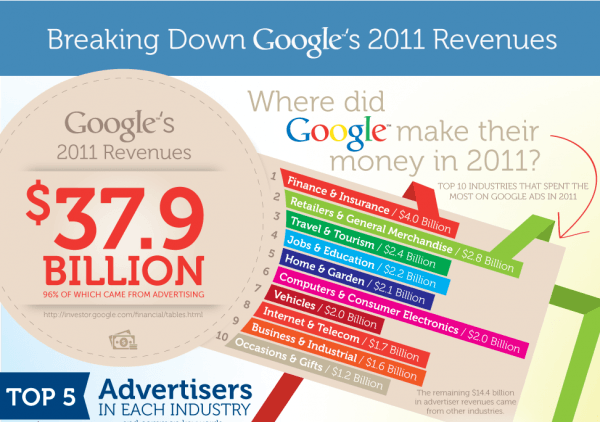
When you are deciding how much budget to allocate to your campaign it all comes down to what you can afford initially, but you need to allocate a good amount to actually see what works and what doesn’t. The budget you go with will more than likely increase or decrease over time as you optimise the campaign and make it more profitable.
Shared Budgets
AdWords will allow you to create a shared budget that goes across all your campaigns. I wouldn’t recommend this if you can avoid it unless you have a budget that is large enough to cover all the campaigns. This setting doesn’t work well with smaller budgets.
Limited by Budget
In the campaign tab within AdWords, you will be notified if the campaigns are limited due to the budget. Clicking on the links will take you to a screen estimating what you would receive if you were to increase your daily spend. Always consider what you have available to spend rather than going along with AdWords recommendations as you have to be comfortable with what you are allocating.
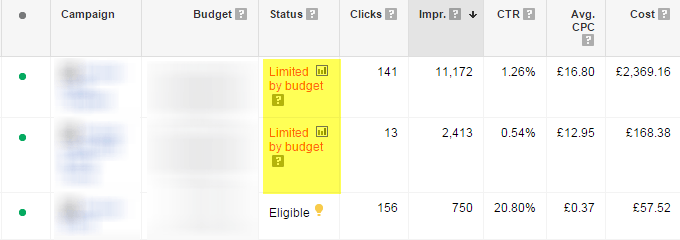
Notification Settings
To avoid running out of pre-pay budget, you can instruct Google to alert you via email if your budget is running low. This is done within the top level account settings under Notification Settings. You should change billing alerts from ‘None’ to ‘All’ to ensure you are always aware if budget is decreasing.
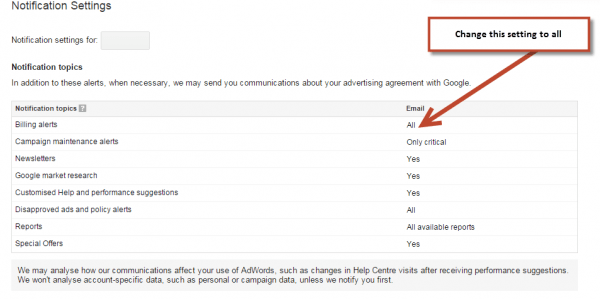
The Adverts
Ad Copy
The copy that you use in your travel ads is one of the most important parts of an AdWords campaign. It acts as the pull for searchers and your advert needs to entice them to click on your ad over the other nine ads that fill the page.
The ad text must be relevant to the users search query in order for it to catch their eye. There is a lot of competition and distractions on the search results page and your ad needs to really stand out in a crowd.
Let’s take a look at a search for ‘All Inclusive Holidays’ and see what we can learn:
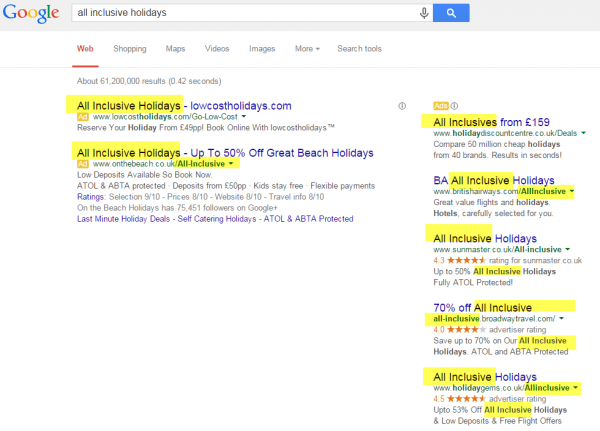
You will see in the screenshot that I have highlighted each mention of ‘all inclusive’ and the reason for this is to show you how important it is for the search query to be present in the advert.
Here are a few things that you need to consider when writing ad text:
- Have tightly themed ad groups so the ad text can match the search query
- Include discounts and offers
- Make use of the Display URL to include another mention of the search query
- Look at the ad extensions available to you and get them added to the campaign so they appear in the ad
- Include prices from if you know you have a good deal
- Pick out USPs that differentiate you from the competition
- Test different ads to see what works and what doesn’t
- Look at a call to action to entice people to click through
Landing Pages
Once a searcher has clicked on your advert, they need to be taken to the most relevant landing page for that search. It is no good sending someone to a beach holiday page if they have searched for ski holidays.
The attention span of searchers is reducing more and more when it comes to searching online. They want to find what they are looking for and they want this fast. Sending them to a non-targeted landing page just pushes them to go back to the search results and click on a competitor’s advert.
Take a look at this landing page. I searched for ‘All Inclusive Holidays’ and in this example, I am just sent to the Home page of the site meaning that I have to conduct the same search within their website to get me to the all inclusive holidays section.
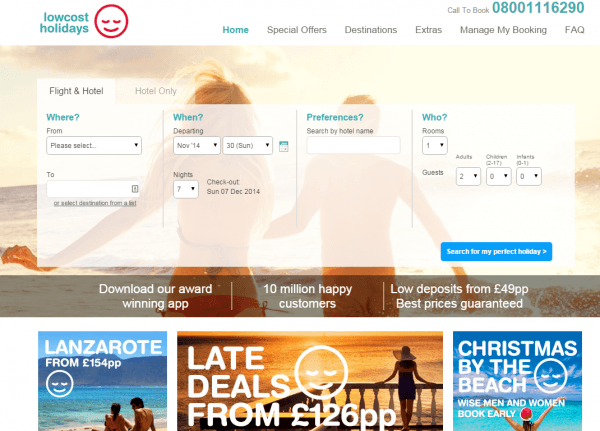
The screenshot below is an example of a landing page that is much more suited to my search. It talks about the Top 10 All Inclusive Deals of the week so I immediately know that I am in the right place for what I am looking for. Even though I still have to do a second search to drill down further, the page gives me what I am looking for and gives me confidence that I am in the right place.
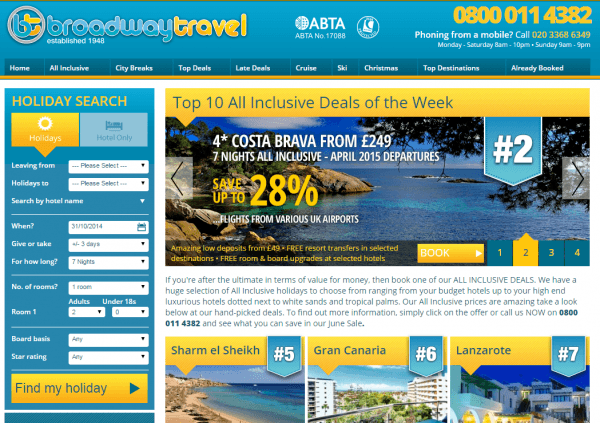
If you aren’t able to send traffic to a relevant landing page within your main website, there are platforms out there that can help you with this. Unbounce is a tool that we use and love at Koozai. It allows you to create bespoke PPC landing pages in your website design so they look and feel like your site.
Some key things that should be included on a landing page:
- Customer reviews
- Star ratings
- Information about holiday or destination
- Photos
- Videos
- Credit Card trust symbols
- Multiple contact details
- Booking system
- ABTA and ATOL or relevant trust symbols
Final point to make on landing pages; the Home page is not a landing page unless someone has searched for your brand term.
Ad Extensions
Some of the relevant ad extensions should be used in every PPC campaign to help make the adverts more enticing to the searcher. I am not going to go into detail about ad extensions in this post as Tara has recently published a video on this very subject. If you want to know more about ad extensions and those that would be good for the travel industry.
The Competition
Competitor Analysis
As I mentioned earlier, the travel industry is one of the most competitive industries on AdWords with thousands of advertisers competing for the ad space. Because there is such a high level of competition, it is vital that you do your research to really understand the businesses that you are up against.
When I say research your competition I don’t just mean look to see who is advertising on AdWords, I mean you really need to research them. Some of the things you need to look at include:
- What keywords are the competition bidding on?
- What are they saying in their ad text?
- How do their prices differ to yours?
- Do they have any special offers or discounts on that you need to compete with?
- What ad extensions are they using?
- How do their customers talk about them online?
- What landing pages are they sending searchers to?
- Is their product offering more diverse to you?
- What are their USPs?
- How frequently are their adverts appearing in the search results?
- Do they have lots of images of the holiday destination on their landing page to make them more appealing?
In order to compete you need to know what you are up against and the research isn’t a once done job and then forgotten about. You need to stay on top of it and really keep an eye on what is going on and what the competitors are doing. It is no good advertising the exact same holiday as a competitor, but for more money as people are very price led so nine times out of ten, you are going to lose out.
SpyFu is a pretty good tool for helping you uncover the keywords that your competitors are bidding on and the ad text that they are using. It is not 100% accurate as the only place you can find that data out is at Google (and they won’t be telling you) but it gives you some insight that you can work with.
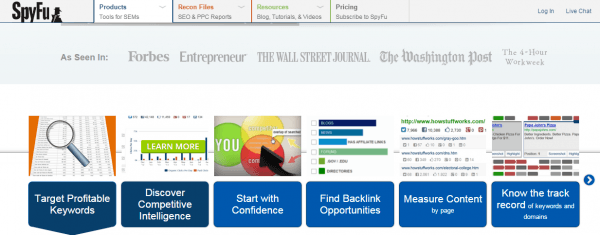
The Keywords
Short and Long Tail
The graph below shows you the average monthly searches for the term ‘holidays’ and there is a huge amount of search volume. Obviously this is a very broad term and unless you are one of the major holiday players, you may not want to advertise on this. People searching for one word phrases tend to be in research mode and therefore the term may not convert well for you.

This graph shows average monthly search volume for the longtail phrase ‘beach holidays in Rio’. As you can see, the search volume drops down significantly but the term is much more targeted with the searcher knowing what they are looking for. They may still be in research mode but they will be a lot closer to making their decision as they have already decided on the destination and holiday type.

Deciding what keywords you bid on comes down to your product offering and how much budget you will be allocating to the campaign.
The more targeted terms often cost more to bid on but you will get less search volume which should convert at a higher rate. The broad terms such as ‘holidays’ will likely cost less but you will get a much higher search volume meaning the overall cost to you could be higher.
I have used the AdWords Keyword Planner to get an idea of costs for a couple of keywords. You should do the same with the keywords you are looking to bid on but the data should not be taken literally as until you launch your campaign, you won’t know the exact costs Google are going to charge you.

Brand Terms
I often get asked by companies whether or not they should be bidding on their brand term and my answer will always be yes.
Branded keywords often have a much higher quality score and therefore, the PPC features available to you will be higher.
Have a look at the screenshot below where you can see lots of different ad features that you don’t see in standard adverts.
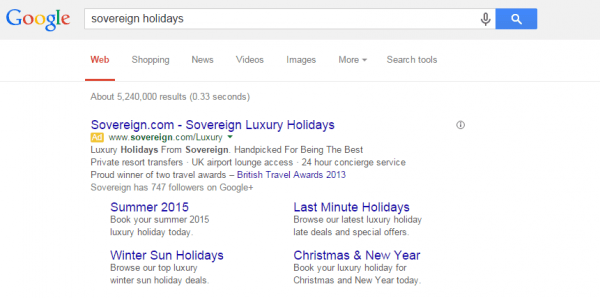
Negative Keywords
As with any PPC campaign, there will be thousands of negative keywords that you should be adding to eliminate wasted budget where searchers have clicked on your adverts after searching with an irrelevant term.
Some examples of negatives will include:
- Free terms to whittle out those looking to not spend money on their holiday
- Competition terms to avoid people looking to get away at no cost
- eBay unless you are selling holidays via that platform
- Photos to stop people seeing your ads when they are not actually looking to make a purchase
- Destinations you don’t operate in
Google allows you to add up to 10,000 negative keywords per campaign so you should ensure that you are making the most of these. A lot of the negatives will come off the back of your keyword research as when you are looking for the relevant phrases, the research will also pull up a lot of the irrelevant phrases.
Negatives should be backfilled each time you go through the search query report to uncover the search phrases people have used when clicking on your ads. Irrelevant queries should be added as negatives and relevant queries should be added to the campaign in a targeted ad group.
The Measurement
The final part of this post is all about the measurement. There is no point running a PPC campaign and not measuring whether or not it has been successful for you. There are so many different metrics that you can use to measure the performance, but you need to work out the right ones for you.
For example, the main goal for the travel industry is likely to be bookings but there could also be additional goals such as brochure requests or information downloads. These would then act as your core goals.
In addition, there are metrics that need to be measured to make sure the campaign performance is going in the right direction to help you achieve your end goals. These could include Click through Rate (CTR), Cost per Acquisition (CPA), Conversion Rate, Cost per Click (CPC) etc.
Each of these need to be monitored and optimised, so you are staying ahead of the game and not letting one metric run away from you.
There are three main platforms that you should be using to measure the performance of your PPC account:
- Google AdWords
- Google Analytics
- Call Tracking (which ever platform you choose)
Being armed with these three platforms and making sure that you analyse and act on the data continuously allows you to make decisions on what is working and what is not. If something doesn’t work within AdWords, don’t be afraid to switch it off and try a different option. For example, ad text should always be split tested and refined. There is never going to be a perfect advert and there will always be ways to make it better. Some keywords might work initially for you and then stop. Analyse the data and work out why and whether you should switch that particular keyword off and try another one.
The Summary
Considering that Google officially surpassed $50 billion in total advertising revenue in 2013, AdWords is an extremely lucrative business and these figures are only set to go up. There is a lot of business to be made from AdWords but it needs to be done the right way in order to make that business profitable for you.
If you want to read more about PPC, we have written lots of content around this topic please see our whitepapers section. There are also lots of blog posts on the Koozai blog which may interest you.
Hopefully these pointers have given you some food for thought, but if you need any assistance with your paid search campaigns, please do get in touch.
Image Credit by BigStock Images.





Leave a Reply